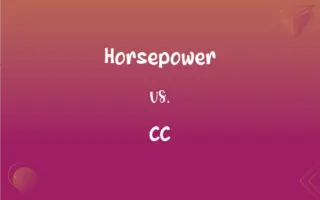Christianity vs. Orthodox Christianity: What's the Difference?
Edited by Aimie Carlson || By Janet White || Published on February 25, 2024
Christianity is a broad religion centered on Jesus Christ, while Orthodox Christianity is a traditionalist branch maintaining early Christian beliefs and practices.

Key Differences
Christianity, a major world religion, is based on the life and teachings of Jesus Christ. Orthodox Christianity, a distinct branch within Christianity, emphasizes adherence to the original teachings and traditions of the early church.
Theological interpretations in Christianity vary widely among different denominations. Orthodox Christianity strictly follows the theological and liturgical practices established in the first seven ecumenical councils.
Christianity encompasses various denominations like Catholicism, Protestantism, and Orthodoxy. Orthodox Christianity is characterized by its preservation of ancient Christian traditions and rituals, often unchanged.
Governance in Christianity differs among denominations; for example, Catholicism has a centralized papal authority. Orthodox Christianity is organized into several autocephalous (self-governing) churches, each led by a bishop.
Worship styles in Christianity range from the simple to the elaborate. Orthodox Christian worship is known for its liturgical richness and use of icons in devotion.
ADVERTISEMENT
Comparison Chart
Theological Interpretation
Varies among denominations
Strict adherence to early teachings
Denominations
Includes Catholic, Protestant, etc.
One of the main branches of Christianity
Traditions and Rituals
Diverse across denominations
Maintains ancient Christian traditions
Church Governance
Varies (e.g., Papal, congregational)
Autocephalous churches led by bishops
Worship Style
Ranges from simple to elaborate
Liturgical, with emphasis on icons
ADVERTISEMENT
Christianity and Orthodox Christianity Definitions
Christianity
A belief system emphasizing salvation through Jesus.
The core of Christianity is the belief in Jesus as the Savior.
Orthodox Christianity
A Christian tradition using icons in religious practice.
Iconography is a significant aspect of Orthodox Christianity.
Christianity
A tradition with various worship and community practices.
Christianity expresses faith through different cultural customs.
Orthodox Christianity
A branch of Christianity preserving early Christian traditions.
Orthodox Christianity is known for its traditional liturgy.
Christianity
A religion based on the teachings of Jesus Christ.
Christianity is one of the world's largest religions.
Orthodox Christianity
A faith maintaining the teachings of the early church councils.
Orthodox Christianity upholds the decisions of the ecumenical councils.
Christianity
A historical religion influencing global culture.
Christianity has played a significant role in shaping history.
Orthodox Christianity
A Christian denomination with emphasis on liturgical practices.
In Orthodox Christianity, liturgical rituals are central to worship.
Christianity
A faith with diverse denominations and beliefs.
Christianity includes a wide range of theological perspectives.
Orthodox Christianity
A self-governing branch of Christianity with historical roots.
Each Orthodox Christian church is autocephalous.
Christianity
A religion based on the life and teachings of Jesus. Most forms of Christianity hold that Jesus is the son of God and is the second person of the Trinity, through whom humans may attain redemption from sin.
FAQs
What is Christianity?
A religion centered on the life and teachings of Jesus Christ.
What is Orthodox Christianity?
A traditional branch of Christianity maintaining early Christian practices.
Are the beliefs of Orthodox Christians different from other Christians?
While core beliefs are similar, Orthodox Christians have unique practices and interpretations.
What languages are used in Orthodox Christian liturgy?
Liturgy is often conducted in ancient languages like Greek or Church Slavonic.
What role do saints play in Orthodox Christianity?
Saints are highly venerated and considered intercessors before God.
Do Orthodox Christians recognize the Pope?
Orthodox Christians do not recognize papal authority as in Catholicism.
How are clergy organized in Orthodox Christianity?
The clergy includes bishops, priests, and deacons, with bishops being the highest authority.
What is the Orthodox Christian view on the afterlife?
They believe in eternal life, with the soul's fate determined by God's judgment.
How does Orthodox Christianity differ from other Christian denominations?
It strictly adheres to ancient traditions and early church teachings.
What is the significance of icons in Orthodox Christianity?
Icons are venerated as sacred art, playing a key role in Orthodox worship.
How do Christians view salvation?
Salvation is generally seen as being through faith in Jesus Christ.
Do Orthodox Christians participate in sacraments?
Yes, they partake in sacraments like baptism, Eucharist, and confession.
What is the Holy Trinity in Christianity?
The belief in one God in three persons: Father, Son, and Holy Spirit.
Are there different branches within Orthodox Christianity?
Yes, there are several autocephalous Orthodox churches, like Greek and Russian Orthodox.
How does Orthodox Christianity view Mary, the mother of Jesus?
She is highly revered as the Theotokos, or God-bearer.
How is the Bible interpreted in Orthodox Christianity?
Interpretation is based on early church teachings and patristic writings.
How is Easter celebrated in Orthodox Christianity?
Easter is celebrated with a rich liturgical tradition, often on a different date than Western Christianity.
What is the role of the Bible in Orthodox Christianity?
The Bible is central, interpreted within the tradition of the church.
What is the history of the split between Orthodox and other Christians?
The Great Schism in 1054 split Christianity into Western (Catholic) and Eastern (Orthodox) branches.
How is Christmas celebrated in Orthodox Christianity?
Christmas is celebrated with liturgical services, often on January 7th due to the Julian calendar.
About Author
Written by
Janet WhiteJanet White has been an esteemed writer and blogger for Difference Wiki. Holding a Master's degree in Science and Medical Journalism from the prestigious Boston University, she has consistently demonstrated her expertise and passion for her field. When she's not immersed in her work, Janet relishes her time exercising, delving into a good book, and cherishing moments with friends and family.
Edited by
Aimie CarlsonAimie Carlson, holding a master's degree in English literature, is a fervent English language enthusiast. She lends her writing talents to Difference Wiki, a prominent website that specializes in comparisons, offering readers insightful analyses that both captivate and inform.






































































